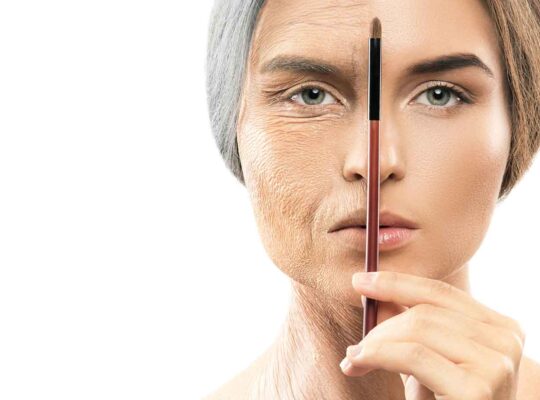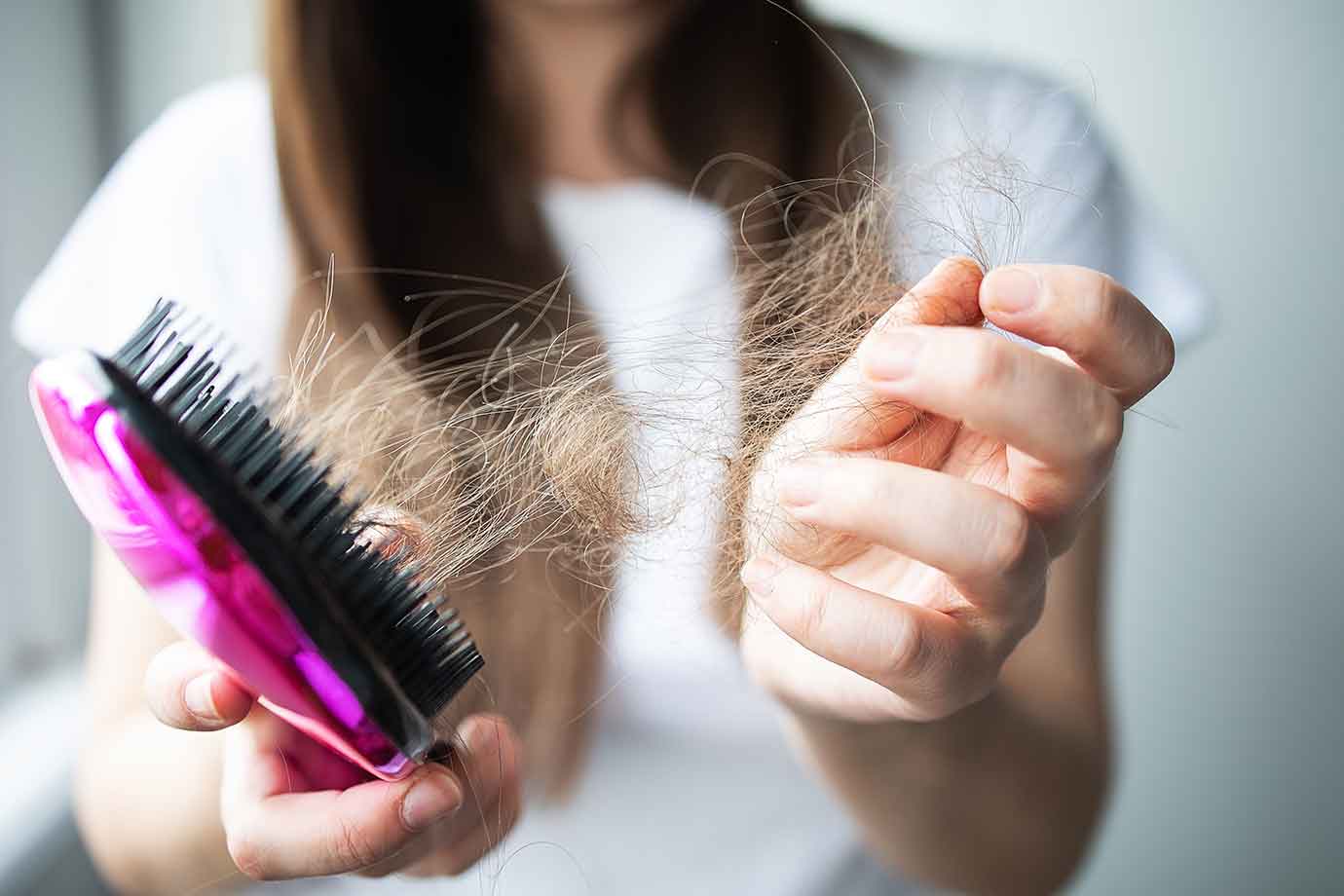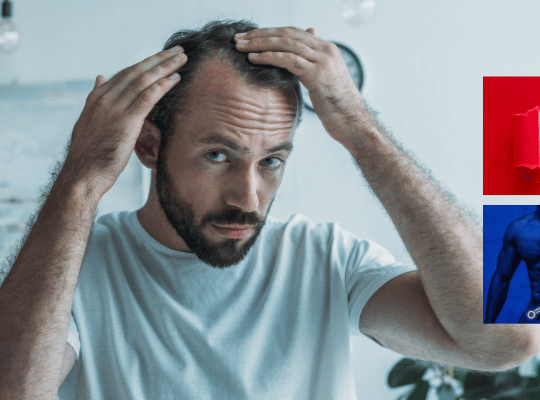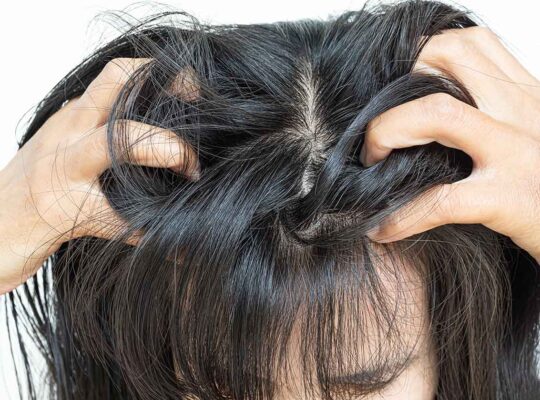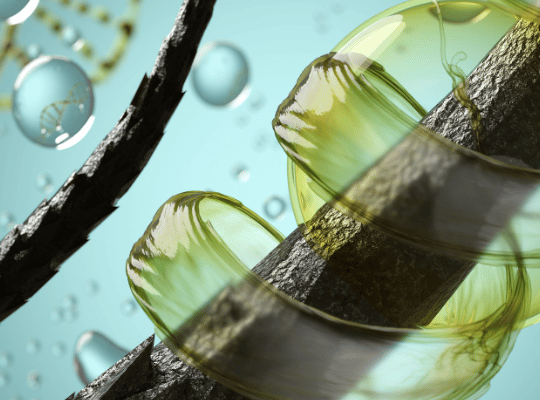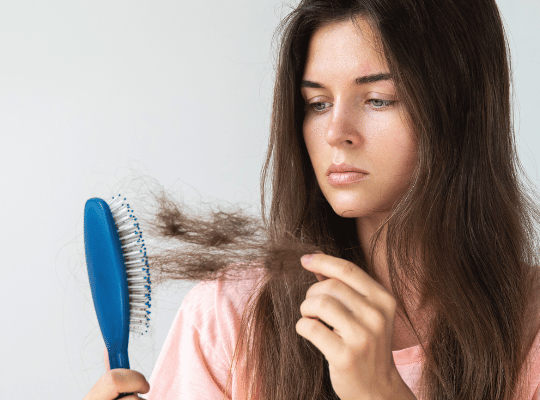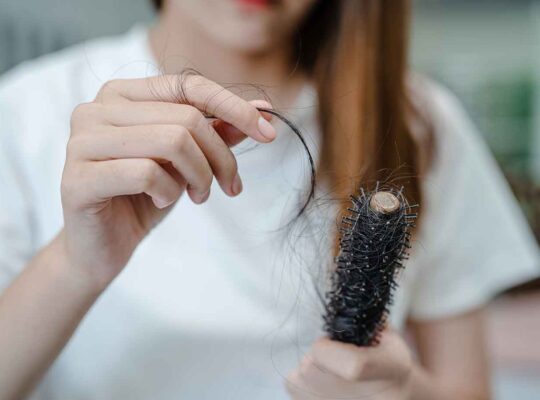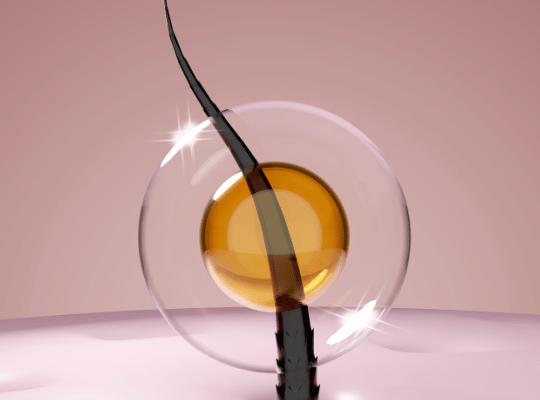Unraveling the Hormonal Hair Connection
Have you ever noticed changes in your hair during different stages of life, like pregnancy or menopause? These changes can be confusing, but they’re often linked to hormones. From the thick, shiny hair many women get during pregnancy to the thinning that can happen during menopause, hormones play a big role in how healthy your hair is. Understanding how hormones affect your hair can help you manage and even prevent hair loss throughout your life. In this guide, we’ll explore how hormones impact your hair during different stages and what you can do about it.
The Basics of Hair Growth and Hormones
To understand how hormones affect your hair, it’s important to know how hair grows. Hair goes through three phases: anagen (growth), catagen (transition), and telogen (rest). Hormones can influence each of these stages, affecting how long your hair grows and how thick it is.
- Estrogen: Often called the “female hormone,” it helps keep hair in the growth phase longer, leading to thicker, longer hair.
- Progesterone: Works with estrogen to keep your hair healthy.
- Androgens: These are typically male hormones, but women have them too. They can make hair follicles shrink, which leads to thinner hair.
- Thyroid Hormones: These hormones also play a part; if they’re out of balance, they can disrupt the hair growth cycle and cause hair loss.
Pregnancy and Hair Changes
Pregnancy brings many changes to a woman’s body, and hair is one of them. During pregnancy, the body produces more estrogen, which keeps hair in the growth phase longer. This means less shedding and fuller, shinier hair. Many women notice their hair looks and feels great during pregnancy.
However, after giving birth, estrogen levels drop, leading to what’s known as postpartum hair loss. This type of hair loss usually happens a few months after giving birth and can last from six to twelve months. While it might be alarming, it’s usually temporary, and your hair growth should return to normal over time.
Hormonal Contraceptives and Hair
Birth control pills and other hormonal contraceptives can have different effects on your hair. Some women find that their hair looks healthier and grows better on the pill because of the estrogen it contains. However, for some women, the change in hormone levels can lead to hair loss, especially if they’re sensitive to androgens.
When you stop using hormonal contraceptives, you might notice more hair shedding for a while. This is just your body adjusting to the change in hormones, and it usually settles down after a few months.
Perimenopause and Hair Loss
Perimenopause is the time leading up to menopause, and it’s a period of significant hormonal changes. During this time, the levels of estrogen and progesterone fluctuate, which can cause physical changes, including those affecting your hair.
Many women notice that their hair becomes thinner during perimenopause. This happens because the balance between estrogen and androgens changes, leading to more hair shedding and less hair growth, especially on the front and top of the scalp.
Menopause and Its Impact on Hair
Menopause brings even more hormonal changes, especially a drop in estrogen levels. This decrease can lead to a type of hair loss called female pattern hair loss, where the hair becomes thinner and the hairline might recede. The increase in androgen sensitivity during menopause can make hair loss worse.
Without the support of estrogen, hair can start to look finer and less vibrant. Many women notice that their hair, which was once thick, becomes sparse, particularly around the crown and sides. Knowing these changes can help you find the right treatments and adjust your hair care routine.
Other Hormonal Factors Affecting Hair Loss
Other than the major life stages, several other hormonal factors can cause hair loss. Thyroid disorders, such as hypothyroidism (underactive thyroid) and hyperthyroidism (overactive thyroid), can interfere with hair growth, making hair brittle and causing it to shed more.
Polycystic ovary syndrome (PCOS) is another condition that affects hormone levels. Women with PCOS often have higher levels of androgens, which can lead to hair thinning and even male-pattern baldness. Stress is another factor that can affect hormone levels, leading to increased cortisol production, which can negatively impact hair growth.
Diagnosis and Treatment Options
If you’re dealing with hair loss, getting the right diagnosis is key. Seeing a healthcare professional can help you identify any underlying hormonal imbalances and find the right treatment. Hormone replacement therapy (HRT) is one option for women going through menopause. It can help reduce hair loss by restoring hormone levels.
If you prefer non-hormonal treatments, options like minoxidil can help. Nutritional supplements rich in vitamins and minerals that support hair health can also make a difference. Working with a healthcare provider ensures you get a treatment plan that’s tailored to your needs.
Lifestyle Factors and Hair Health
Taking care of your overall health is important for maintaining healthy hair. A balanced diet that’s rich in vitamins, minerals, and proteins supports the hair growth cycle. Foods high in biotin, zinc, and omega-3 fatty acids can make your hair stronger and more resilient.
Managing stress is also important because chronic stress can throw your hormones out of balance and lead to hair loss. Relaxation techniques like meditation or yoga can help reduce stress and improve your overall well-being. Additionally, adopting gentle hair care practices, such as avoiding excessive heat and using gentle hair products, can protect your hair from damage.
When to Seek Professional Help
While some hair loss is normal, certain signs mean it’s time to see a doctor. If you notice a lot of shedding, significant thinning, or sudden bald patches, it’s important to get help. A healthcare provider can evaluate your condition, run tests, and recommend a treatment plan that’s right for you.
Consider seeing specialists like dermatologists, who focus on skin and hair health, or endocrinologists, who specialize in hormone-related issues. Getting expert advice ensures you get the best care for your hair.
Conclusion
Understanding how hormones affect your hair can help you take better care of it throughout your life. Whether you’re dealing with changes from pregnancy, menopause, or other hormonal imbalances, knowing what’s happening with your body can help you make informed decisions.
By recognizing how hormones influence your hair, you can address concerns early and find the right treatments. Remember, you’re not alone—there are professionals who can help, and sharing your experiences with others can provide valuable support. Take charge of your hair health and stay informed to keep your locks looking beautiful through all of life’s stages.
Frequently Asked Questions (FAQs)
- What causes hair loss during menopause?
Hair loss during menopause is mainly due to hormone changes, especially a drop in estrogen, which can make your body more sensitive to androgens, leading to thinning hair and a receding hairline. - How can I manage hair loss due to hormonal changes?
Managing hair loss involves getting advice from a healthcare provider, eating a nutritious diet, and using stress management techniques to keep your hormones balanced. - When should I seek professional help for hair loss?
You should see a doctor if you’re losing a lot of hair, notice significant thinning, or see sudden bald patches. They can help diagnose the problem and offer treatment. - Are there non-hormonal treatments for hair loss?
Yes, treatments like minoxidil can work without affecting your hormones. You can also use nutritional supplements that provide the vitamins and minerals your hair needs to stay healthy. - How do lifestyle factors impact hair health?
Your lifestyle, including your diet and how you manage stress, can have a big impact on your hair. Eating well and practicing relaxation techniques can help your hair grow and stay healthy.


